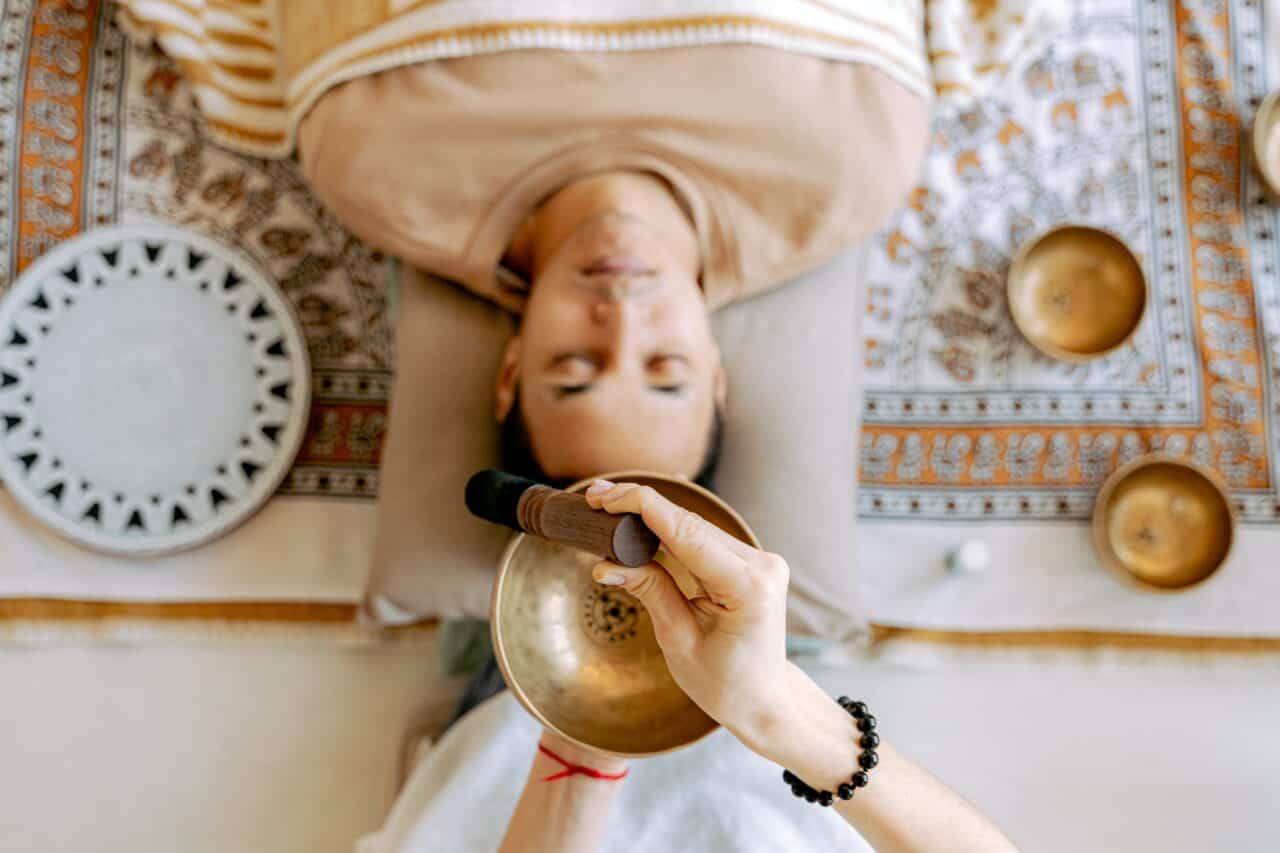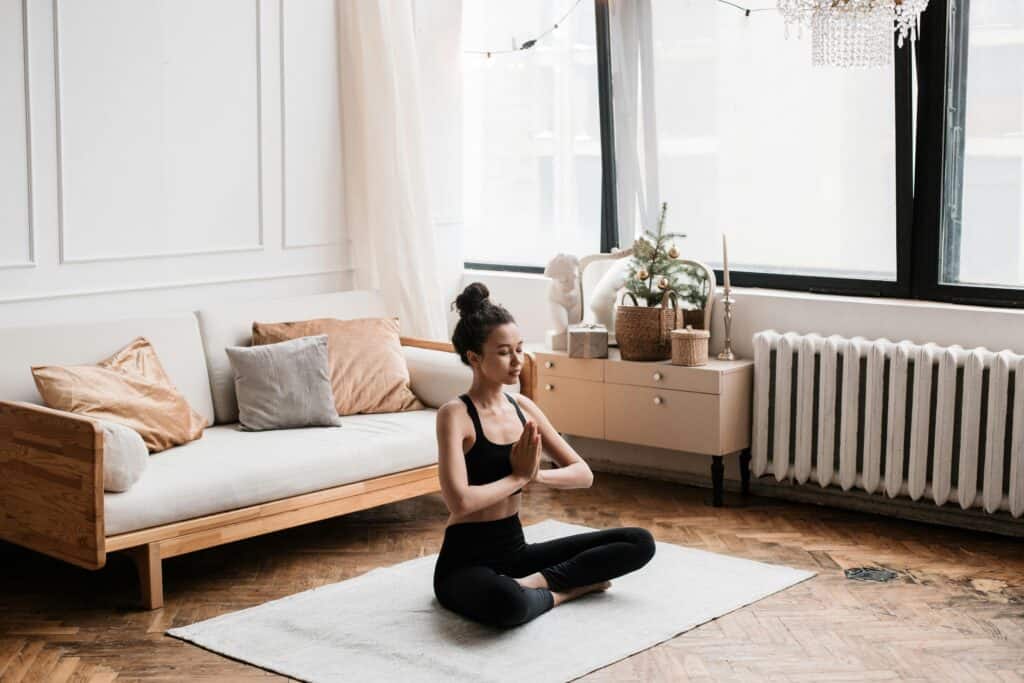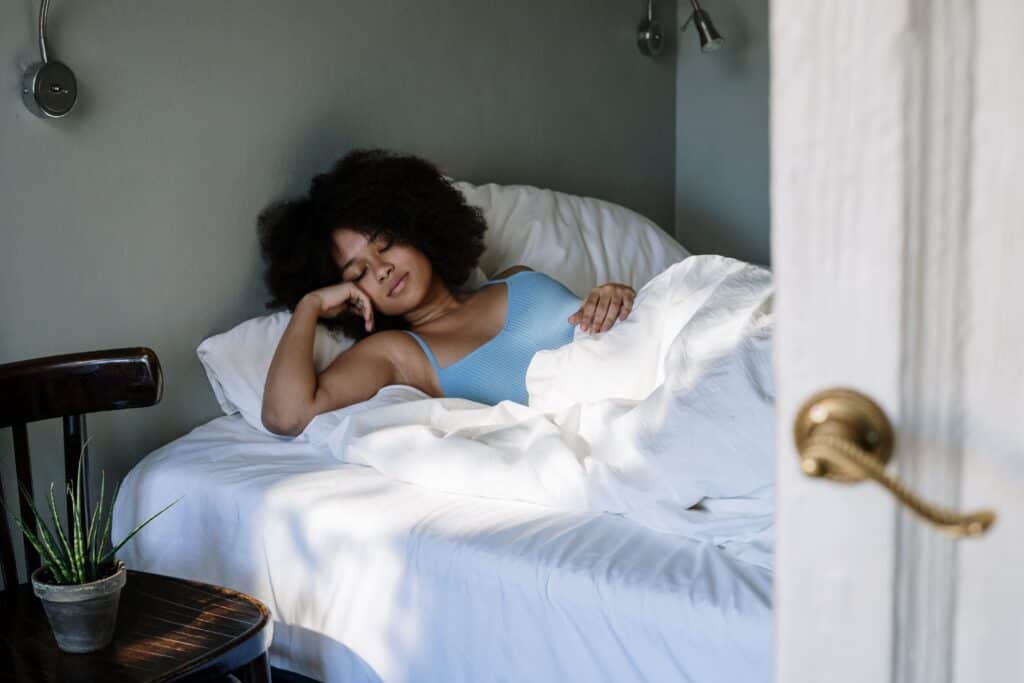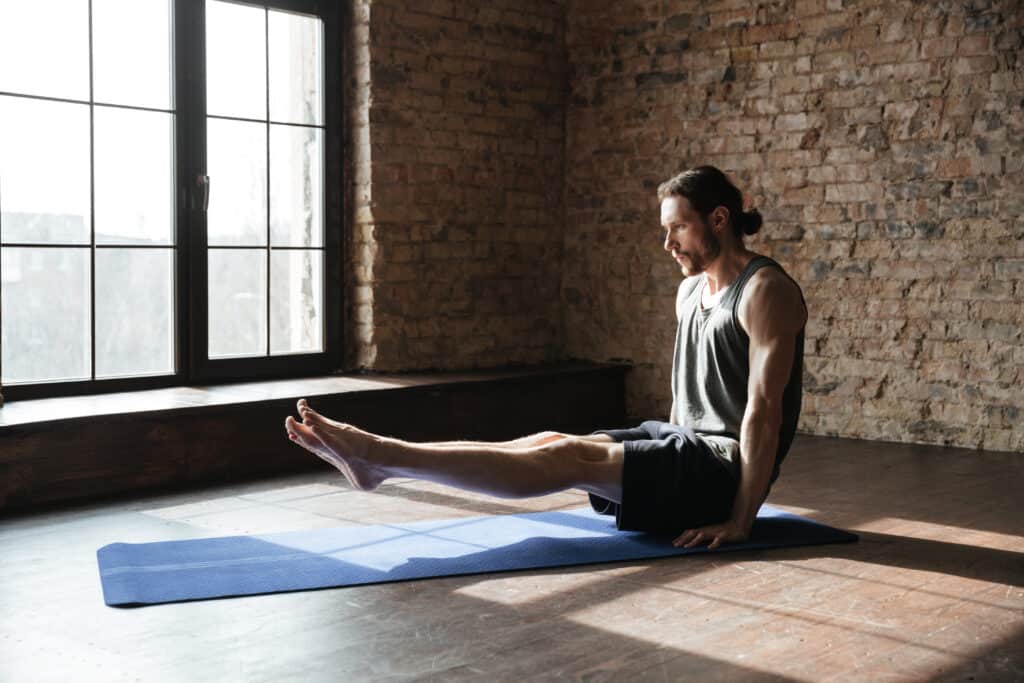
Exercise and Sleep: Tips for Your Nighttime Routine
Sleep – an essential pillar of our health and yet a real challenge in our hectic daily lives. You’ve likely experienced nights when falling asleep was a struggle and the day’s stress lingered. But you surely know how crucial quality sleep is for your mood, concentration, and physical performance.
To support you in your nightly sleep routine, we spoke with M.Sc. Psychologist Heike Reuber from 7Mind. The team also recently developed the 7Sleep sleep app – scientifically based and tailored to your needs. As an expert in mindfulness and sleep, she provided valuable insights and practical tips on the subject. Discover how sport and sleep influence each other.
Heike, what’s your response to one of the most debated questions: How much sleep do I really need?

The question of the ideal sleep duration can’t be answered with a single number. Sleep needs are individual and influenced by various factors. Genetics play a significant role, as do lifestyle and environmental conditions. Thus, sleep duration changes over the course of one’s lifespan. The US National Sleep Foundation released recommendations in 2015 (1) categorizing healthy individuals into different age groups. According to their assessment, the trend is clear: over life, sleep duration notably decreases, from up to 17 hours in newborns to only seven hours in old age.
However, it’s essential to consider that these recommendations represent specific groups and may not apply universally. Rather than strictly adhering to a number, it’s more crucial to understand your own sleep behavior. For example, maintaining a sleep diary can help identify patterns and draw personal conclusions.
What are the benefits of restful sleep for my wellbeing?

Most have likely experienced the drawbacks of insufficient sleep, such as irritability or decreased performance. Sleep and wellbeing reciprocally influence each other: high internal tension affects sleep, and vice versa, a restless night impacts the mood the next day.
We rejuvenate physically and mentally during the night, as sleep figuratively organizes the brain and other bodily systems, for instance, through the glymphatic system. Although research in this area is still developing, this system functions as the brain’s waste disposal mechanism (2). It consists of numerous channels through which cerebrospinal fluid flows, transporting cellular waste. Experts suggest that 90-95% of waste clearance occurs during deep sleep phases. The waste disposal seems more thorough during sleep than while awake (3).
Therefore, restful sleep is crucial for learning processes and memory performance (4). Neural connections require training. The more signals are transmitted at brain synapses, the stronger the retention of learned information. This consolidation occurs during sleep, akin to a workout unnoticed by our waking selves.
A meta-analysis with data from over 8000 people suggests that improved sleep quality correlates with enhanced mental health (5). Symptoms of anxiety, depression, rumination, and stress appear to decrease with more restful nights.
How does exercise influence sleep?

Our understanding of exercise can vary significantly. Assessing how it impacts sleep depends on multiple variables, such as timing, duration, or intensity. Nonetheless, a meta-analysis from 2021 suggests a general connection (6). Regular exercise was associated with improved sleep quality, mostly reflected subjectively rather than objectively.
In 2021, a research group examined the effects of High-Intensity Interval Training (HIIT) (7). They aggregated the results of several individual studies into a meta-analysis, highlighting HIIT’s potential. They concluded that intensive exercise could benefit sleep. Specifically, they recommended HIIT sessions of over 16 minutes, practiced up to three times a week for at least eight weeks.
Does this apply to mindfulness-based movements like yoga?

Yes, another meta-analysis from 2022 supports that calmer forms of exercise can positively impact sleep quality (8). There was a significantly higher effect when practiced twice a week compared to once a week, over a period of more than three months. Consistency seems to yield results.
These recommendations may not apply equally to everyone. Conducting a brief self-check before and after exercising can help consciously perceive its current impact on personal wellbeing and potential effects on sleep.
What are soothing sleep habits I can adopt?

In psychology, there’s a crucial term when it comes to sleep habits: sleep hygiene. It includes established recommendations on conducive circumstances, measures, and behaviors for restful nights. These can help to reduce the risk of sleep disturbances and prevent relapses. However, there’s flexibility. It’s entirely acceptable to approach these recommendations with a certain flexibility. Not adhering to specific rules doesn’t necessarily mean a decline in sleep quality. Pressure is generally detrimental to restful sleep. A relaxed attitude, which can also be cultivated through mindfulness exercises, is more helpful. Sleep hygiene can provide guidance to become an expert in your own affairs. Among these recommendations:
Buffer zone.
This is a time period before bedtime to wind down. Rushing through the day and expecting to instantly fall asleep usually doesn’t work. If possible, integrating a buffer zone into your evening routine to unwind is beneficial.
Bed = Sleep.
This recommendation relates to learning processes. Ideally, the bed should only be associated with behaviors conducive to sleep. Working, watching TV, or using your phone in bed may unconsciously link the space to a non-sleep-inducing activity level. Ideally, the bed should be reserved solely for sleeping. Sexuality is an exception.
Consistency.
It’s advisable to wake up at the same time, even if the weekend occasionally allows for a later morning. Consistent times can facilitate falling asleep and waking up, enhancing sleep quality.
Comfortable environment.
The sleep surroundings should be inviting. Warm lighting, pleasant temperatures, or a comfortable bed contribute to this. Anything that feels good and relaxes. A ritual can also be a lovely way to start the night with a pleasant feeling. How about a cup of lavender tea, Progressive Muscle Relaxation, or a gentle stretching session?

For helpful sleep habits, the focus is often put on the evening. It’s essential to understand that sleep develops throughout the day—and it’s strongly linked to stress experiences. Therefore, reflecting on daytime activities is as crucial as sleep hygiene recommendations in preparing a favorable path for nighttime sleep.
What can I do if I can’t sleep?

Lying in bed with a carousel of worries, tossing and turning constantly, is not a good idea. Yet, none of us are immune to challenging nights. What can help in these situations? There’s no magic formula, but maintaining a relaxed mindset is often crucial. Falling and staying asleep become much more difficult under pressure, anxiety, or stress.
Psychology suggests getting up if wakefulness persists. Otherwise, unconscious learning processes may occur, associating the bed with unpleasant wakefulness. Engaging in calm activities outside the bed, such as reading, doing puzzles, or listening to relaxing music, might be beneficial.
If there’s a pattern of evening worries, the worry chair can be a helpful tool. As soon as the cycle of worries begins, individuals get out of bed and sit on a specific chair. Then they set a timer, for example, to 10 minutes. During this time, they let their worries flow freely and actively contemplate them. This can also be done in writing. Once the time is up, conscious conclusions are drawn about these worries. An individual ritual, such as a closing phrase like “Enough pondering for today,” can also be employed.
Support Your Sleep Routine with 7Sleep
Apps like 7Sleep can assist your sleep routine. The platform focuses entirely on users’ sleep – from falling asleep, staying asleep, and waking up to establishing favorable daytime conditions. Exercises during the day help reduce stress, and educational content provides valuable insights into sleep. The app accompanies individuals on their unique journey toward a healthy sleep routine.
We hope Heike’s tips help you find or improve your personal sleep routine. Do you have additional tips that aid you? Share them with us in the comments.
IMPORTANT: Many sleep problems requiring treatment, such as sleep apnea, often go undetected because affected individuals do not seek medical care (9). If sleep difficulties persist and impact daily life significantly, 7Mind recommends seeking medical or psychotherapeutic support.

Sources
(1) Hirshkowitz M, Whiton K, Albert SM, et al. National Sleep Foundation’s updated sleep duration recommendations: final report. Sleep Health. 2015;1(4):233-243. doi:https://doi.org/10.1016/j.sleh.2015.10.004
(2) Xie L, Kang H, Xu Q, et al. Sleep Drives Metabolite Clearance from the Adult Brain. Science. 2013;342(6156):373-377. doi:https://doi.org/10.1126/science.1241224
(3) Fultz NE, Bonmassar G, Setsompop K, et al. Coupled electrophysiological, hemodynamic, and cerebrospinal fluid oscillations in human sleep. Science. 2019;366(6465):628-631. doi:https://doi.org/10.1126/science.aax5440
(4) Maski K, Holbrook H, Manoach D, Hanson E, Kapur K, Stickgold R. Sleep Dependent Memory Consolidation in Children with Autism Spectrum Disorder. Sleep. 2015;38(12):1955-1963. doi:https://doi.org/10.5665/sleep.5248
(5) Scott AJ, Webb TL, Martyn-St James M, Rowse G, Weich S. Improving Sleep Quality Leads to Better Mental health: a meta-analysis of Randomised Controlled Trials. Sleep Medicine Reviews. 2021;60(60):101556. doi:https://doi.org/10.1016/j.smrv.2021.101556
(6) Xie Y, Liu S, Chen XJ, Yu HH, Yang Y, Wang W. Effects of Exercise on Sleep Quality and Insomnia in Adults: A Systematic Review and Meta-Analysis of Randomized Controlled Trials. Frontiers in Psychiatry. 2021;12. doi:https://doi.org/10.3389/fpsyt.2021.664499
(7) Min L, Wang D, You Y, Fu Y, Ma X. Effects of High-Intensity Interval Training on Sleep: A Systematic Review and Meta-Analysis. International Journal of Environmental Research and Public Health. 2021;18(20):10973. doi:https://doi.org/10.3390/ijerph182010973
(8) Yang J, Du Y, Shen H, et al. Mindfulness-Based Movement Intervention to Improve Sleep Quality: A Meta-Analysis and Moderator Analysis of Randomized Clinical Trials. International Journal of Environmental Research and Public Health. 2022;19(16):10284. doi:https://doi.org/10.3390/ijerph191610284
(9) BARMER. Gesundheitsreport 2019 | BARMER. www.barmer.de. Published September 2, 2019. Accessed November 21, 2023. https://www.barmer.de/presse/infothek/studien-und-reporte/gesundheitsreport-2019-1056360
(10) Li Y, Sahakian BJ, Kang J, et al. The brain structure and genetic mechanisms underlying the nonlinear association between sleep duration, cognition and mental health. Nature Aging. 2022;2(5):425-437. doi:https://doi.org/10.1038/s43587-022-00210-2



Comments